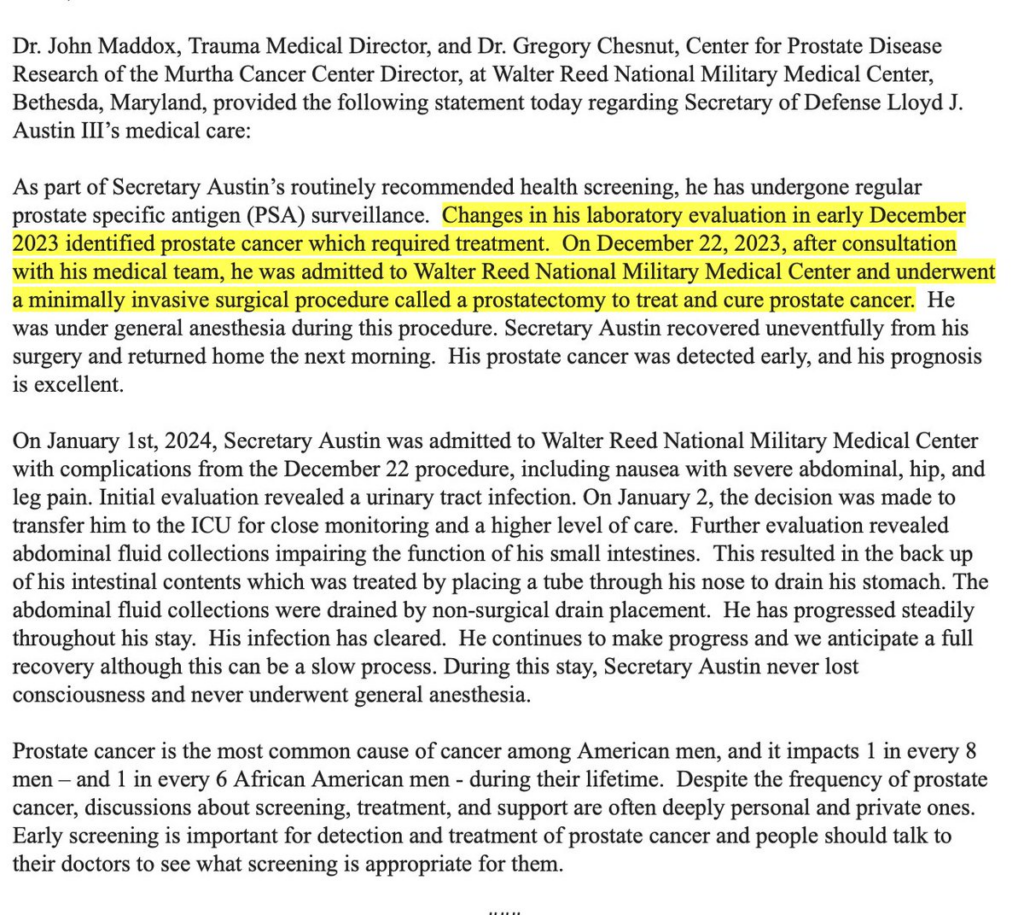For four days last week, no one in the White House, State Department, the Intelligence Community, or most of the Pentagon knew that Secretary of Defense Lloyd Austin was in the Walter Reed National Medical Center intensive care unit. When National Security Council spokesman John Kirby joined White House spokeswoman Karine Jean-Pierre for a joint press conference today, any hope we may have had that the story was overblown was not put to rest. On the contrary, the new information makes the situation look much worse.
Before going to today’s briefing, let’s review the bidding.
Late Friday afternoon, the Department of Defense released a statement saying that Austin was in the intensive care unit at Walter Reed NMC due to “complications” from an unspecified “elective” surgical procedure. The statement revealed that he’d been admitted to the ICU on New Year’s Day. As happens with these things, more facts started dribbling out. As it turned out, Congress wasn’t informed of Austin’s incapacity unit 15 minutes before the rest of the world. The service chiefs, service secretaries, and other senior Pentagon staff found out two hours before the public announcement. We were told that Austin’s deputy, Kathleen Hicks, National Security Adviser Jake Sullivan, Secretary of State Antony Blinken, and Joe Biden got the news on Thursday (keep this sentence in mind because we’re going to talk more about that later). Joint Chiefs of Staff Chairman C. Q. Brown was told on Tuesday. Supposedly, Austin’s chief of staff, Kelly Magsamen, found out on Tuesday, but she was home with the “flu” and decided to wait until she got back to work on Thursday before telling anyone.
At some point, Austin’s personal staff started telling people that he was “working from home.” At that point, the problem stopped being just an Austin problem and became an issue of his entire staff being loyal to him and not to the institution or president they served.
On Monday, the Pentagon announced an inquiry into their procedures to see if anything was done wrong. As if to signal total contempt for America, Austin’s chief of staff, the same one who knew about him being incapacitated for two days before telling anyone, was charged with getting to the bottom of the story.
With pressure building to verify that the “elective” surgery wasn’t something like an eggplant jammed up his rectum
Austin’s doctors released a statement.

Note the cute little “you may be a racist if you question this” statement in the last paragraph. Sorry, no one is really interested in the demographics of people with prostate cancer; we’re interested in one particular Secretary of Defense.
The minimally invasive elective surgery was treatment for prostate cancer.
Today, though, NSC spokesman John Kirby tried to tamp down the growing sense of unease about the state of affairs in the Pentagon.
My colleague Susie Moore gives a great rundown of that press conference in her post, ‘Not Optimal’: John Kirby Acknowledges SecDef Austin’s Failure to Notify WH of Condition Is a Problem. In short, given the facts, Kirby did as well as anyone could do, but it probably won’t be good enough.
But today’s revelations have raised a whole new set of questions.
Elective Surgery?
When did cancer surgery become elective? (Full disclosure: my father died of metastasized prostate cancer, and I’ve had friends and colleagues who’ve had a variety of treatments for the disease.) Sure, if you’re male and live long enough, you’re probably going to have prostate cancer. Unless the cancer is aggressive or interfering with the urinary tract, most doctors will recommend leaving it alone and monitoring its progress. Austin is 70. Odds are he’ll not have to worry about prostate cancer. The surgery would only be elective if Austin opted for surgery when less invasive strategies were available. Otherwise, it would require surgery.
General Anesthesia?
Austin went in for this so-called elective surgery on December 22 and was placed under general anesthesia.
BREAKING: @SecDef was admitted to Walter Reed on Dec. 22 for "a minimally invasive surgical procedure called a prostatectomy to treat and cure prostate cancer.
— Lara Seligman (@laraseligman) January 9, 2024
He was under general anesthesia during this procedure," per Pentagon
At that point, his deputy should have had full powers as Secretary of Defense delegated to her. Did that happen? We don’t know, but a safe bet is that Austin concealed this “elective” procedure just as he did the four days in the ICU.
Then, some things really went off the rails. The question was asked: when did Joe Biden find out that Austin had been hospitalized for a lower urinary tract infection that was the result of cancer surgery?
When Was Biden Told About the Surgery and the Cancer?
The biggest story here is that Biden was told Tuesday morning that Austin had been treated for prostate cancer. According to the narrative, Biden was told on Thursday about the hospitalization, but we are to believe he didn’t ask, “Why?”
The second story here may be a slip of the tongue because Kirby was getting the prison shower treatment. He says Biden was told “Friday” about the hospitalization. According to the previous narrative, the White House and State Department were told on Thursday. If Kirby is correct, it means that the NSC and White House Situation Room knew about Austin’s hospitalization, but Jake Sullivan never told Joe Biden.
Why Did Austin Stonewall the White House About His Cancer?
If Kirby is correct about Biden only learning about the cancer treatment today, it means that Austin stonewalled the White House for 3-4 days about the reason he was in the ICU and seems to still be at Walter Reed NMC.
None of this is acceptable. I really don’t care that Austin’s treatment was “deeply personal.” He had a legal duty to ensure the chain of command from the president to the Armed Forces was intact, and he failed to do so on two separate occasions. I’m under no illusions that Biden thinks he can fire a Black SecDef in an election year when it seems like Black voters may not vote lockstep for the Democrat on the ballot. He’s also probably right that he doesn’t have the political capital to get Congress to hold confirmation hearings for a replacement. What Austin has taught us is that he can’t be trusted, and his staff will lie about anything to cover for him. We can’t afford to have that kind of lack of integrity running our military with the challenges we face.


